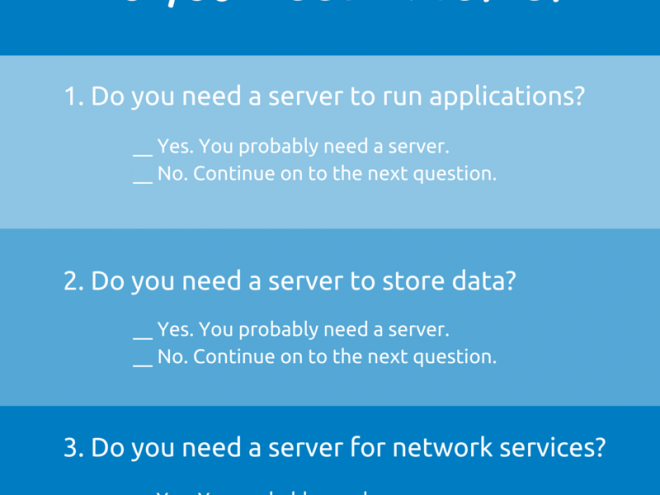
Business owners regularly ask us if they a need a server. If you are a startup or your server support is due to expire soon, now is a good time to ask this question. Many businesses will be evaluating their need for a server because Windows Server 2003 support is due to expire this July.
Understanding what a server does is important in determining if a server is needed. A server is used to run applications, hold data and control networking services. Therefore, if you have other ways to cover these three needs, a server may not be necessary.
1. Do you need to run applications?
The primary reason to buy a server is to run applications. Typically, these are line of business applications, database applications or office desktop software.
Businesses require a server because they chose to host important database applications. However, there is a common trend toward offering SaaS or Software as a Service, which is a web-based (or cloud-based) software.
Make a list of all software requirements. Do any of these applications require a server? If not, you may not need a server.
2. Do you need to store data?
The second most common use for a server is database storage and file sharing. The benefit to storing data on a server is it can be accessed anywhere on the network, remotely and by multiple people. Files can be locked down to specific users or groups. The files can be centrally managed and backed up.
Storing data on individual PCs is highly discouraged for a business. It’s like the Wild West. There is no backup, no access for other users and no central management.
Instead of moving files to an on premise server, moving your files to the cloud maybe be best. Some businesses use a cloud-based file server or a file sharing program like Dropbox, Google Drive or OneDrive. Be sure to research the pros and cons of each file sharing application.
If hosting your data seems like a good fit for your business, you may not need a server.
3. Do you need network services?
The final item to consider regarding a server is networking services. Businesses commonly use a server to offer the following networking services:
a) Active directory – centrally manages all user accounts.
b) Network access – connects to the Internet or printer.
c) Shared printers, scanners and Internet connection.
Alternatively, in some small networks these could be handled by a firewall, router or switch. Often times new network devices can be run off of the network without a need for a server. However, running network services on a server is better.
Other considerations
Most of this blog has been discussing when you don’t need a server. But it’s important also consider a server’s needs. A server needs space. Ideally, a locked closet that can be kept cold and away from workers who would be distracted by the noise. They also require a lot of bandwidth.
Contact us if you would like to know more about whether or not your business needs a server.
[include id=”13″ title=”Blog CTA How To Find The Right IT Services Provider”]
 Lori Mankin, Marketing Coordinator
Lori Mankin, Marketing Coordinator
Our goal for this blog is to answer the questions you ask. If you have any questions about server replacement or any other topic please email me at [email protected]. To learn more about IT subscribe to our blog.



